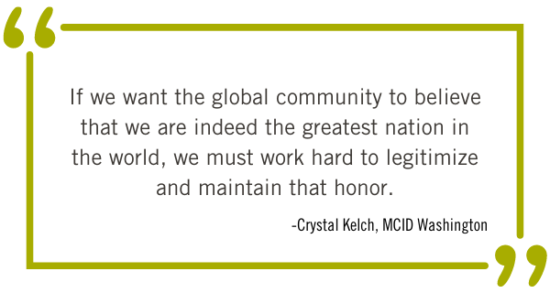By Crystal Kelch, Director, MCID Washington

The past 12 months have been fraught with fear, anxiety, and violence. The pandemic stole loved ones, immobilized the masses, and inadvertently forced us to pay attention to the myriad social ills prevalent in our society, particularly apparent in the killing of George Floyd and the insurrection at the U.S. Capitol. We watched—aghast, horrified, saddened. And the world watched these atrocities unfold in real time, surprised to see that this proverbial beacon of democracy was flawed and vulnerable. Our past was exposed, while the meanness of an era long forgotten by some, reared its ugly head. Our democracy suddenly became the subject of skepticism and fodder at dinner tables around the world. The international community we serve now knows the truth—the United States of America is imperfect.
The dictionary defines “imperfect” as faulty or incomplete, a description that adequately describes a relatively young nation. A work in progress may be a more accurate depiction. If we want the global community to believe that we are indeed the greatest nation in the world, we must work hard to legitimize and maintain that honor.
The people of the United States—government and civil society alike—should be working feverishly to right the wrongs of the past to create an environment for future generations that is fair and equitable for all. This requires that we reckon with our past to understand the issues that impact communities that have been historically marginalized and, in many cases, disenfranchised.
Many were surprised at the brutality inflicted on Breonna Taylor, George Floyd, Rayshard Brooks, Daniel Prude, and others, by the civil servants tasked with protecting our nation’s citizens: the police. The reaction of Black and Brown communities, however, was not surprise; it was anger, resentment, and despair at a system that treats communities of color as insignificant, inhumane. Their deaths signaled to the world that racism is pervasive in the structure of our country’s power base. People around the world protested in the name of George Floyd, but for the principle of fairness and equality. They did so with the intent of affecting change to the inherent policies that disproportionately disadvantage minority communities at home and abroad. It was their right to protest injustice.
And then, there was the insurrection at the Capitol.
Is this the “America” that we want to present to international visitors? As purveyors of information, it is incumbent upon all of us to portray an accurate depiction of the United States by exposing visitors to different communities, particularly those of color, and ideas that will help them shape their perspective of the nation and its citizenry. If we can engage international visitors with such compassion, we can certainly expand our outreach to Black and Brown professionals in this country to establish relationships and cultivate a more diverse array of resources for participants who can exchange ideas on a range of topics.
Additionally, we must educate ourselves about our history in its entirety—not just the parts that we choose to embrace, but the segments of our past with which we may not be acutely familiar or are too uncomfortable to broach. International exchange participants are not shy about asking questions about race or racial injustice in this nation, so we must be prepared to give an accurate response.
Let’s be the United States that we can be proud of—one where people of different backgrounds can share the hard truths with one another in an effort to understand our challenges and address our faults. This country may be young in comparison to many around the world, but the global community looks to us as the example to emulate. We can share our truths—the good, the bad and the ugly—as long as we are honest with ourselves and our participants that we are still a work in progress.
